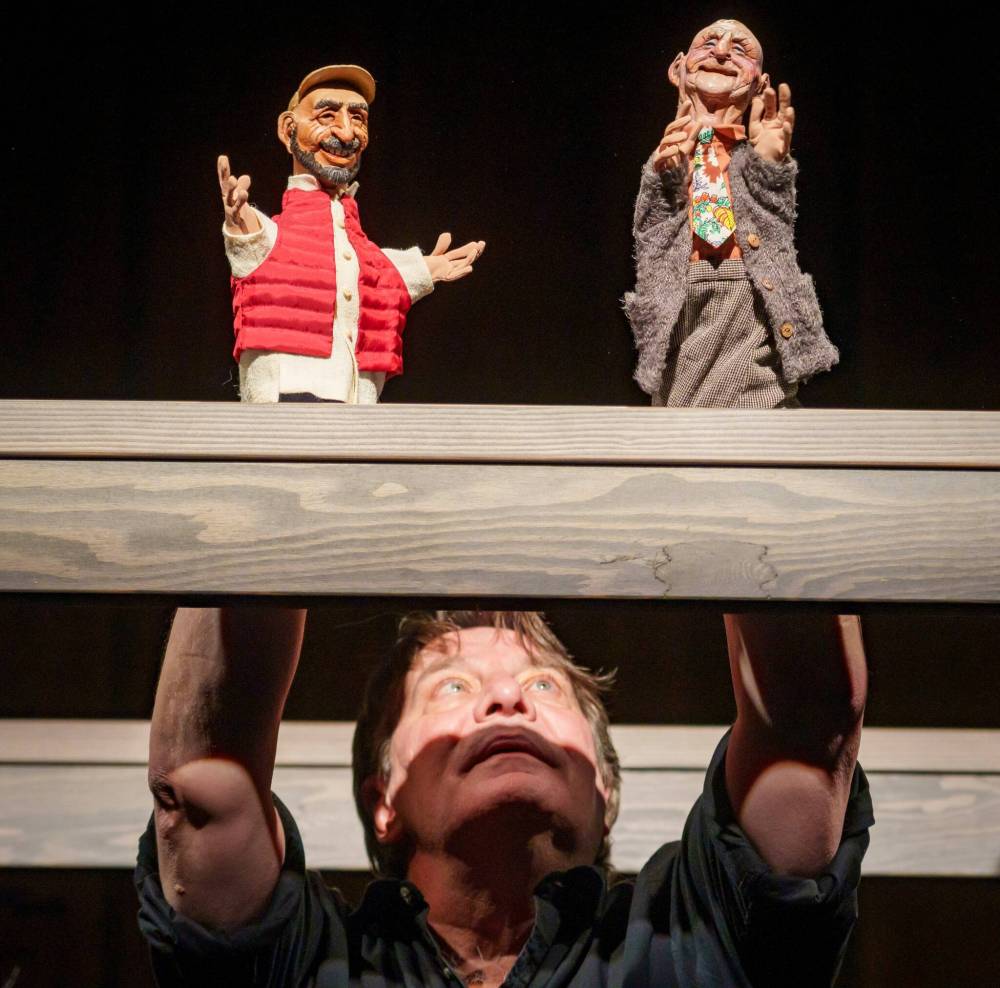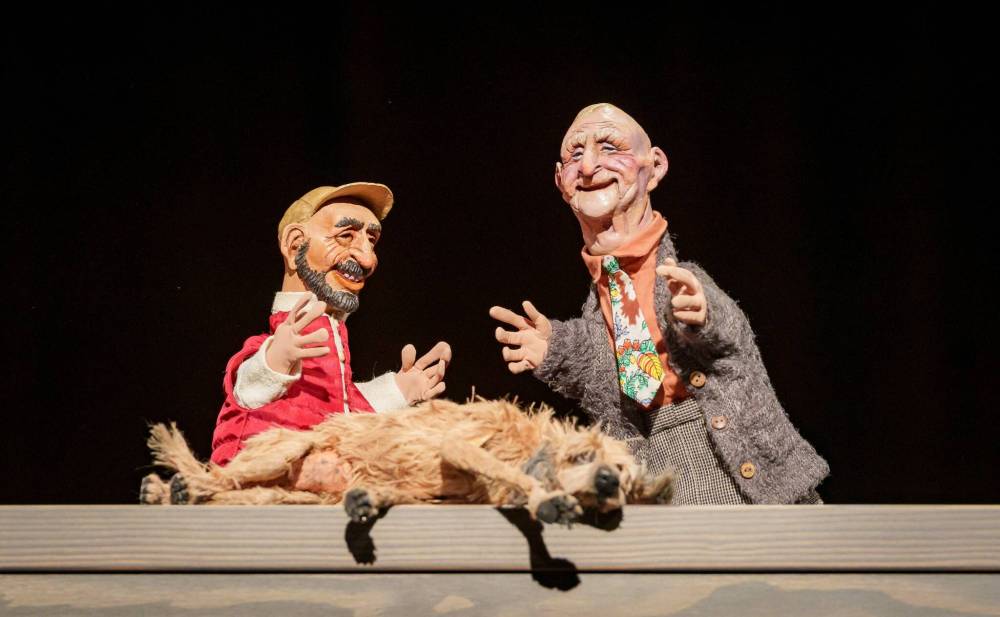Puppet picaresque
On Joe’s journey, it’s people who give a street character
Advertisement
Read this article for free:
or
Already have an account? Log in here »
To continue reading, please subscribe:
Monthly Digital Subscription
$1 per week for 24 weeks*
- Enjoy unlimited reading on winnipegfreepress.com
- Read the E-Edition, our digital replica newspaper
- Access News Break, our award-winning app
- Play interactive puzzles
*Billed as $4.00 plus GST every four weeks. After 24 weeks, price increases to the regular rate of $19.95 plus GST every four weeks. Offer available to new and qualified returning subscribers only. Cancel any time.
Monthly Digital Subscription
$4.99/week*
- Enjoy unlimited reading on winnipegfreepress.com
- Read the E-Edition, our digital replica newspaper
- Access News Break, our award-winning app
- Play interactive puzzles
*Billed as $19.95 plus GST every four weeks. Cancel any time.
To continue reading, please subscribe:
Add Free Press access to your Brandon Sun subscription for only an additional
$1 for the first 4 weeks*
*Your next subscription payment will increase by $1.00 and you will be charged $16.99 plus GST for four weeks. After four weeks, your payment will increase to $23.99 plus GST every four weeks.
Read unlimited articles for free today:
or
Already have an account? Log in here »
The wrecking ball is a meteor that predicts a sidewalk-level extinction event in marionette artist Ronnie Burkett’s Wonderful Joe, an urban journey that begins with an eviction notice delivered to a denizen who remembers when the cornerstones were laid and the first bricks were thrown.
Neither Burkett, who manipulates a coterie of neighbourhood everybodies, nor Joe ever uses the term “aging in place,” but once the superintendent delivers the decree that redevelopment is on the horizon, the octogenarian springs into motion as a walking-tour guide along a promenade of fading history.
With one month to go before the jackhammers rattle the foundation, Joe gently carries his ancient pup Mister down to the sidewalk for one last stomp around Eileen Street, a thoroughfare that houses a wide array of impressive characters amid the graffiti.

IAN JACKSON PHOTO
Marionette artist Ronnie Burkett brings a cast of complex characters to life in Wonderful Joe.
In his return to the Tom Hendry Warehouse after a 20-year hiatus, the Toronto-based Burkett, a Siminovich Prize laureate, brings along a supporting cast of marionettes who each possess their own fascinating wrinkles and elongated features.
Not quite lifelike, yet not quite unreal, the puppets — developed by Burkett and his nine-person studio — navigate their space with startling control, carrying within their bodies the weight of lived experience as they step up, lean back and turn away, perhaps forever.
Throughout the production (which ran shorter than its advertised 95 minutes, with no intermission), Burkett, who performs from a perch, is careful not to look down his nose at the residents of Eileen Street, imbuing his characters with enough complexity to evade accusation of caricature.
Joe is not simply a kindly old man: he’s an erstwhile hustler, a back-lane survivor and gender-affirming barber who’s on a first-name basis with everyone he sees, including Santa Claus, the Tooth Fairy and Jesus Christ.
Joe’s disposition is one grounded in unshakable belief: tomorrow is only a day away.
While Wonderful Joe is quite overtly a story of gentrification in a geographical sense, it also forces consideration of how the displacement of longtime residents and frequenters can upset the delicate balance of inter-relativity and community support that sprouts up when official channels fall short.
In an early scene, Minnie, the leader of a back-alley theatre company, approaches Joe with concern that Terry, a social worker who used to work in the housing department, is conspiring to have her killed.
In certain rows, this at first elicited laughter, but Burkett’s flips the script during a remarkably potent exchange between the two women. Terry’s heard all this before from Minnie, and reassures her that she loves her, even if the drama queen’s mood swings. Who would understand Minnie so readily as her neighbours if she were shunted to the other side of town?
The narrative impact of gentrification is also illustrated quite well during Minnie’s grand production, a collection of monologues she calls The Last Dinosaurs.

IAN JACKSON PHOTO
Sunny (left) and Joe (with dog Mister) swap stories about life on Eileen Street in Wonderful Joe.
Each of the stories shared — by a fiercely independent mother wrestling with child services; a trans sex worker who stands up; and an aging punk who loves the queen — is a stirring reminder of the importance of preserving and amplifying queer histories on a broader scale, though it’s not that these characters who’ve made it to the end of this respective era had hoped to stand alone as keepers of community biography.
“I never wanted to be a historian,” says Sketch, the mohawked punk.
Neither necessarily did Burkett, whose punchy writing elevates Wonderful Joe throughout its discursive structure, ooey-gooey ending aside. But like Minnie’s monologists, Burkett knows how precious it is to stand before a captive audience.
While Burkett is mostly in the shadows, he is briefly cast in bright spotlight during The Last Dinosaurs segment, a gentle nod to the puppetmaster’s acceptance of himself as an elder who has seen enough to know where he stands.
These are the stories that Burkett has lived to tell.
ben.waldman@freepress.mb.ca

Ben Waldman is a National Newspaper Award-nominated reporter on the Arts & Life desk at the Free Press. Born and raised in Winnipeg, Ben completed three internships with the Free Press while earning his degree at Ryerson University’s (now Toronto Metropolitan University’s) School of Journalism before joining the newsroom full-time in 2019. Read more about Ben.
Every piece of reporting Ben produces is reviewed by an editing team before it is posted online or published in print — part of the Free Press‘s tradition, since 1872, of producing reliable independent journalism. Read more about Free Press’s history and mandate, and learn how our newsroom operates.
Our newsroom depends on a growing audience of readers to power our journalism. If you are not a paid reader, please consider becoming a subscriber.
Our newsroom depends on its audience of readers to power our journalism. Thank you for your support.



